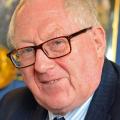
AMBULANCE services and response times in rural areas were debated in parliament last week and Ludlow town councillor and campaigner Darren Childs says he plans to bring together a group to try to make progress.
Mr Childs became leader of the campaign after his young daughter, who was thankfully okay in the end, had a long wait for an ambulance after suffering a fit.
Now Mr Childs says that he is hoping to set up a committee of GPs, nurses, councillors and campaigners to give south Shropshire a stronger voice in improving services.
He has been trying to set up a meeting with Louise Barnett, chief executive of the Shropshire and Telford NHS Trust that runs the hospitals in Shrewsbury and Telford.
“Ambulance hand over delays are unacceptable and emergency departments are dangerously crowded,” said Mr Childs.
“Almost every day, I see patients, often frail and vulnerable, enduring long agonising waits in ambulances and on trolleys.
“Recently, someone even waited 24 hours on an ambulance.”
Mr Childs believes the problem is long and complex with one of the major features being a lack of social care which results in people who could be at home, being in hospital and taking up beds.
Taking part in the debate in Westminster Hall was Helen Morgan, who was elected as MP for North Shropshire at a by-election last December.
She has said that sorting out the ambulance crisis has to be the priority for the Department of Health.
It is understood that Ludlow MP and former health minister Philp Dunne, did not take part in the debate.
He was asked for comment by ‘the Advertiser’ but had not responded at the time of going to press.
Mr Dunne has previously said that he wants to see improvements to the service but is not convinced that the solution suggested by the campaigners, that is to open local stations in south Shropshire, is the correct answer.
The size of Shropshire and the distances from places like Ludlow to major hospitals like those in Shrewsbury, Telford, Hereford, Kidderminster and Worcester is a problem, even after an ambulance arrives.



Comments: Our rules
We want our comments to be a lively and valuable part of our community - a place where readers can debate and engage with the most important local issues. The ability to comment on our stories is a privilege, not a right, however, and that privilege may be withdrawn if it is abused or misused.
Please report any comments that break our rules.
Read the rules here